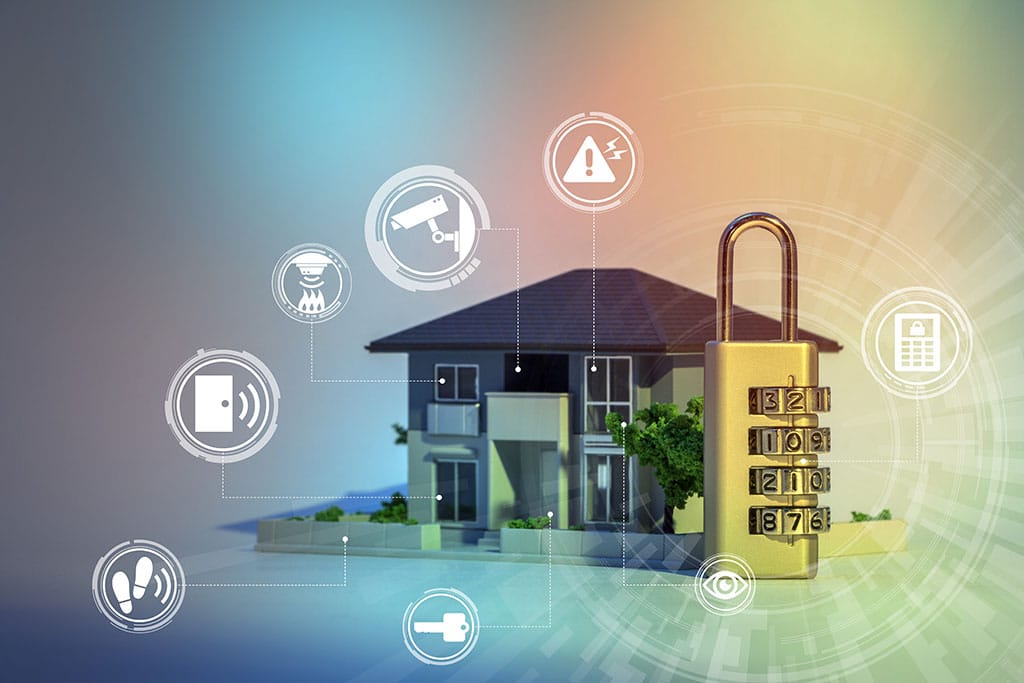Security technology has increasingly grown smarter over time. These days, it’s common for the latest systems to send alerts and alarms to phone apps as well as sounding physical alarms. With this, security & alarm installers also have to grapple with issues like making sure certain devices can access Wi-Fi or explaining compatibility to clients who may want to make sure that their alarm systems will work on certain platforms.
High-tech security systems are getting a significant upgrade this year thanks to the release of what is now called the Matter protocol, previously named CHIP during development. Matter is a huge project that’s working to solve compatibility issues, improve security, and more. Let’s take a look at the basics and what installers should know for now.
What is Matter?
Matter is a communication standard for smart home devices, including security cameras, smart locks, alarms, and a variety of other devices that transmit data over Wi-Fi connections. It originally started as Project CHIP, or Connect Home over IP, a project between major places Amazon, Google, Apple, and Samsung (they would eventually be joined by hundreds of other companies). Their goal was simple, and a long time coming: Create a new standard that would allow smart devices to work innately between all of their platforms, so users would not have to choose specific devices to match the common apps they chose to use, like Alexa, Google Home, or Apple Home.
The work took years, but in 2021 the end was in sight, and the companies announced new branding for the project. It was now called Matter, and it would be released in latter 2022. Now that time has come: Matter is officially here, new devices are launching with Matter compatibility, and it’s expected to become one of the most important standards in the smart home.
We should also mention Thread, a standard that is both part of Matter and a standalone protocol that can exist separately. Thread is a low-power, low-latency networking protocol designed to save energy and improve security for smart devices, but alone it lacks the same compatibility features that Matter has.
Why Does This “Matter” for Alarm Systems?
It’s a significant upgrade that’s generally more reliable, more protected against unauthorized access, and more accurate in its data transmission. That’s reason enough to be excited about Matter coming to newer systems. However, it can also solve some specific problems that can plague alarm systems and annoy owners, such as lack of support from their preferred voice assistants or devices.
What Should Installers do to Prepare?
If you sell products directly or via a partnership, you may want to research your current products and see which will gain compatibility with Matter or at least Thread via updates. If you specialize in a particular security brand or platform, research to see if the brand has announced any compatibility with Matter yet – brands like Control4 have already confirmed it. When Matter does start appearing as a main feature in devices, make sure that any product descriptions and compatibility info on your business’s website is updated.
Should Installers Tell Clients About Matter?
Clients don’t have to know about Matter when making decisions about the alarms and security systems that they want. However, installers can bring up Matter to explain the benefits of specific systems, or how a new device could potentially solve a problem that a client is having. Generally, diving into the technological details isn’t necessary unless clients are asking questions. After all, it’s better to avoid confusion and help buyers make easy decisions. However, your own knowledge of Matter can help you make recommendations.
Does Matter Come with any Risks?
Not really – in fact, because it uses advanced security compared to how wireless devices used to communicate, it’s safer. It can reduce the risk of vulnerabilities in alarm systems, and associated worries about hacking. That also means installers can recommend it with confidence and don’t have to worry as much about liability issues if a system they install is hacked.
The only real risk is that older devices just won’t be compatible with it. That means that if clients want to mix newer and older security devices, some will lack Matter benefits. Devices like security hubs and panels may need to be replaced to support Matter for connected devices in the building.
How Does Matter Affect Pricing?
So far, we have seen a huge price jump for the newest devices that support Matter, although it’s still early. Some of these devices are more expensive, but primarily because they have the latest technology and features, not because of Matter. And for existing compatible models, Matter is added for free. No subscriptions have been required for Matter support either. At most, we expect only minor price increases for Matter support compared to similar products that don’t have Matter.
Matter in Security Systems
While Matter is still a new standard for now, it is already appearing in security systems, especially from developers who have been preparing for it for years. Installers should be ready to explain what Matter means to clients and advise Matter support when it comes to compatibility or security priorities. Get used to seeing the Matter logo – a trio of arrow-like icons in a circle – and it won’t catch you off guard!






